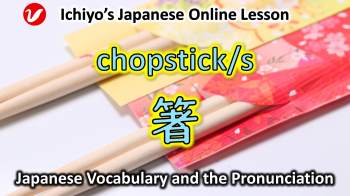The Japanese vocabulary「箸 (はし、hashi)」means “chopstick/s.” Please learn the pronunciation and the example sentences.
Japanese Vocabulary and the Meaning
| Key Word | 箸 |
| Hiragana | はし |
| Romaji Reading | hashi |
| English Meaning | chopstick/s |
The Correct Japanese Pronunciations
Please learn the pronunciation by watching the attached video. You can also learn example sentences.
Our main YouTube channel: Ichiyo’s Japanese YouTube Channel
Our sub-YouTube channel (Japanese vocabulary videos): Ichiyo’s Subchannel
The Example Japanese Sentences
It is important to have skills in both non-honorific and honorific languages in order to use Japanese correctly.
I’ll practice how to use chopsticks.
Plain Form:
箸の使い方を練習する。
Hashi no tsukaikata o renshū suru.
Polite Form:
箸の使い方を練習します。
Hashi no tsukaikata o renshū shimasu.
This store always has disposable chopsticks available.
Plain Form:
この店では、使い捨ての箸が常備されている。
Kono mise de wa, tsukaisute no hashi ga jōbi sarete iru.
Polite Form:
この店では、使い捨ての箸が常備されています。
Kono mise de wa, tsukaisute no hashi ga jōbi sarete imasu.
My chopsticks have a cat pattern.
Plain Form:
私の箸は、猫の柄だ。
Watashi no hashi wa, neko no gara da.
Polite Form:
私の箸は、猫の柄です。
Watashi no hashi wa, neko no gara desu.
I was able to pick up a bean skillfully with my chopsticks.
Plain Form:
箸で豆を上手につまめた。
Hashi de mame o jōzu ni tsumameta.
Polite Form:
箸で豆を上手につまめました。
Hashi de mame o jōzu ni tsumamemashita.
My son learned to use chopsticks at the age of five.
Plain Form:
息子は5歳で箸の使い方を覚えた。
Musuko wa go-sai de hashi no tsukaikata o oboeta.
Polite Form:
息子は5歳で箸の使い方を覚えました。
Musuko wa go-sai de hashi no tsukaikata o oboemashita.
I forgot to put chopsticks in my daughter’s lunch box.
Plain Form:
娘の弁当に箸を入れ忘れた。
Musume no bentō ni hashi o irewasureta.
Polite Form:
娘の弁当に箸を入れ忘れました。
Musume no bentō ni hashi o irewasuremashita.
I was told to hold chopsticks properly by my mother.
Plain Form:
母に箸の持ち方を注意された。
Haha ni hashi no mochikata o chūi sareta.
The subject in the Japanese sentence is “I”, not “my mother”
Polite Form:
母に箸の持ち方を注意されました。
Haha ni hashi no mochikata o chūi saremashita.

